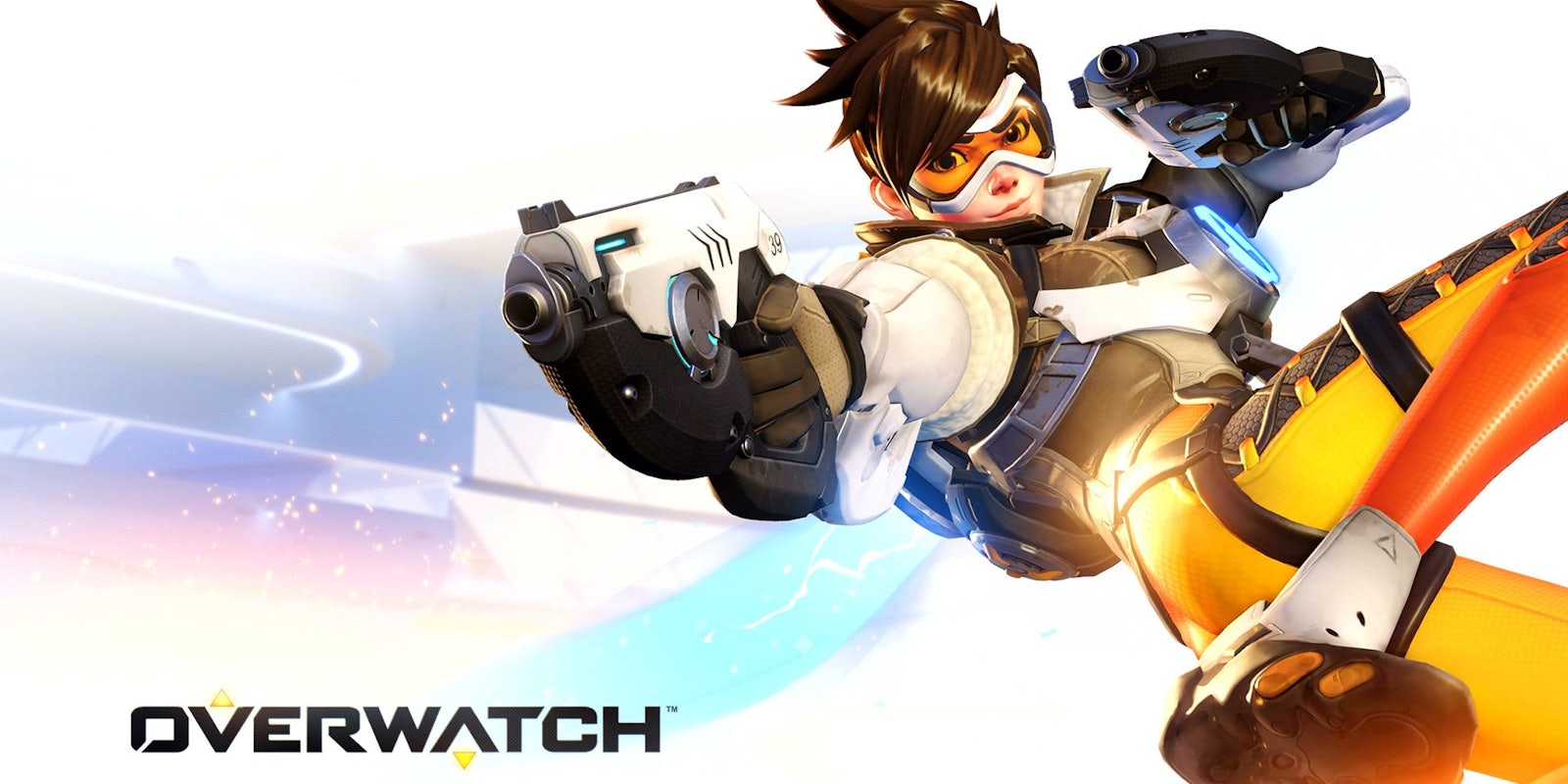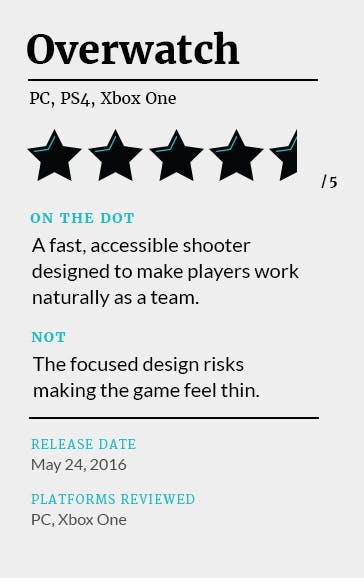Overwatch is a game with two faces. One speaks to the core or PC gamer, and the other to the Overwatch may depend on which face you’re looking at.
Blizzard Entertainment has been tight-lipped about its plans for supporting Overwatch as an esport, but the game feels explicitly designed from the ground up for esports competition. The size of the maps, the pace of the game, the dynamism of how good teams behave, all of this will make for exciting matches between professional players, and Twitch broadcasts that are sure to attract audiences.
What if you’re not someone who plans to play Overwatch professionally, or at a high level? What if Overwatch is just one of a half-dozen or more titles you’ll pick up in 2016 and play without any particular devotion?
Overwatch is a first-person shooter where two teams of six heroes fight for control of objectives on a map. The utter lack of context for these battles highlights the first obvious split between Overwatch’s appeal to general audiences versus esports competitors.
It was no secret prior to release that Overwatch has nothing akin to a story campaign, but the idea of Overwatch telling a story “in a different way” doesn’t hold much water when you play the game.
There’s no single-player campaign in Titanfall, but playing the multiplayer maps in a specific order does tell a tale. The same goes for Brink, another multiplayer-only shooter. Overwatch doesn’t go that far in trying to offer a coherent narrative.
The animated shorts that Blizzard produced in the run-up to the game’s release were superlative, and reminiscent of the shorts that Valve has produced for Team Fortress 2. But I feel about those animated Overwatch shorts the way I feel about Star Wars novels and comic books. If it ain’t in the movies, it doesn’t count.
If Overwatch had split its characters into Hero and Villain classes, and split teams into those categories, and therefore always pitted Heroes against Villains there might some sense of story in the game, but this is not the case. There are villains in Overwatch lore like Reaper and Widowmaker, and proper heroes like Winston and Tracer, but you’ll find all four of these characters on the same team on a regular basis.
Yes, they are all characters in the sense of having unique personalities as expressed by dialogue, but only in that sense. There is, if we’re being honest, not even a wisp of plot and story. For a general audience that hasn’t been ensconced in pre-release marketing, the absence of a narrative might be a surprise.
I expect the esports audience, regardless of how much they’ve read the Overwatch wiki or watched the animated shorts, won’t give a damn. Story has nothing to do with competition, and competition is what Overwatch does well.
Overwatch is always about objectives. There are no Deathmatch modes. Sometimes the teams are designated as attackers or defenders and fight over a pair of objectives. Sometimes there’s only one objective, and it’s mobile. Sometimes both teams fight over a neutral objective that no one owns at the beginning of a match. There are three match types in all.
The game spans 12 maps. Some are locked to specific game modes, while others are used for multiple, different modes. All the maps so far feel well-balanced, offer plenty of different approaches for attacking objectives, and thus create fast-moving, dynamic play where battle conditions can change quickly.
Overwatch is also the second release in the current wave of “hero shooters,” where players do not choose character classes with a wide variety of perks and equipment but instead choose a hero whose weapons and abilities are largely set in stone. In Overwatch you have your weapons, two abilities, a powerful Ultimate ability that charges over time, and that’s it.
The 21 heroes are nicely separated into different classes. Attackers are built to deal damage, Defenders are built to protect their team, Support classes can build static defenses and boost the power of teammates’ abilities, and Tanks are designed to absorb considerable amounts of damage and thus keep the enemy focused on them.
The pre-match screen in Overwatch will tell you whether or not your team is balanced, i.e. if you don’t have enough characters of any particular class. This isn’t as clear as it could be; you’ll see messages about not having enough Snipers or Builders when those are not formal character classes. They refer more to play style. But it doesn’t take long to understand what these messages are trying to say, and making sure your team has enough characters of the right type to balance out the team.
Overwatch’s tactical complexity revolves around the ability to change characters when you die and respawn. Are healers getting killed too quickly to do any good? The healer can change up to an Attack class. Are multiple turrets covering the objective so your team gets slaughtered when you try to approach it? Switch up to a bunch of snipers and take the turrets out from a distance.
Your team is also not limited to having only one of any hero. If three players choose the hero Mercy, and the other three players choose the hero Genji, that’s a valid team composition. Not being stuck with one hero for the entirety of a match and never having to worry about not being able to pick the hero you want really makes it worth learning how each of the 21 heroes function.
Because Overwatch is essentially focused on one game type (Assault, Escort, and Control match types are all about territory control), and because all 21 heroes are easy to pick up and learn, Overwatch is very accessible. Team play trumps individual performance, so players without elite first-person shooter skills won’t have to shy away from Overwatch like they might avoid playing Call of Duty or Halo.
Game “simplicity” also can also be viewed as “thin on content,” depending on whether you’re looking at the game from a general audience perspective or through an esports lens.
It probably won’t take long for players to become familiar with all the match types and maps, and it’s also probable that not everyone will enjoy cycling through all 21 heroes. Overwatch players will develop favorites, so the depth of character selection will not be a long-term appeal for everyone.
Twelve maps is a healthy number. Tying certain maps to specific game modes, and offering a limited selection of match types that are all variants on the same theme, however, should lead to predictable strategies and tactics in relatively short order. Blizzard will be releasing new maps and new heroes for free, but if they’re offered one or two at a time and at appreciable intervals, the same issue of over-familiarity will repeat itself.
The only meaningful sense of progression in Overwatch concerns statistics like high scores, and passing challenges that earn you experience. Leveling up in Overwatch is not about changing your combat performance or unlocking substantive upgrades. It’s effectively about showing off how long you’ve been playing the game.
You earn a loot box each time you level up. Loot boxes contain cosmetic items, like new skins for your heroes or new icons for your player emblem that show up in pre-match and post-match screens. There are real money microtransactions for loot boxes if you don’t want to wait until you level up to earn new ones.
For esports fans, predictability isn’t a bad thing. Getting to recognize the viable team compositions for different maps and situations, understanding well how all the heroes work, and relative simplicity of match type all make for an esport that’s easy to follow, and hence good for broadcast on Twitch.
The more readily you can follow the action, the better any game is as a spectator sport. And professional FPS play often limits competitors to certain maps or class builds in order to maintain balance. Repetition serves esports.
If you don’t care about the ultra-competitiveness of esports, Overwatch could have a much shorter shelf life on account of repetition. Of course it will take months to know whether this concern is valid, but my gut tells me that Overwatch’s longevity will come almost entirely from the esports crowd. Shooter fans generally always move on to the cavalcade of other games regularly vying for their affections.
Overwatch also faces the same challenge as Battleborn in that playing with people you know and playing with random teammates are very different experiences. Overwatch’s challenge in this area isn’t nearly as severe as Battleborn’s, because, again, the match types in Overwatch are far simpler and the goals much more clear. Even teams of random players in Overwatch will generally be in the same place and pursuing the same goals as a loose unit.
The tactical complexity of Overwatch is entirely missing when you’re matched up with random players, however. When I’m playing the game with friends we can coordinate when we’re going with sniper- or tank-heavy team builds. Maybe we need some people with explosive weapons to take down dug-in enemies. In that case we can also make sure we take two or three defense characters to protect the players who are lobbing in the explosives, so those players don’t have to worry about being targeted and can focus on their jobs.
Looking at Overwatch purely on the basis of its design and putting aside the notion of who it was designed for, Overwatch is one of the most enjoyable shooters I’ve played this year.
It’s easy to jump into. Matches are fast-paced and exciting. Overwatch is filled with the same level of personality that all Blizzard games present, and it has the same high level of holistic quality. The voice over performances are solid. The sound design has texture. The art is fantastic.
I reviewed Overwatch on both a PC running at the highest graphics settings, and on the Xbox One, and while the PC version is clearly superior graphically, both versions run smooth as ice with nary a hiccup.
If you are a first-person shooter fan generally, and if you enjoy team-based FPS play specifically, not at least trying Overwatch feels criminal. Blizzard always imparts a deep sense of holistic quality into its games, and Overwatch is no exception.
Score: 4.5/5
Disclosure: Our PC and Xbox One copies of Overwatch were provided courtesy of Blizzard Entertainment.



